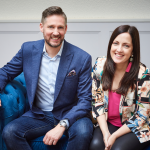Looking for a new job? Completed the application and finally got an interview? Fantastic – yet if you are neurodivergent, this is where the challenges can really start. It’s time to talk about how employers can successfully host neurodivergent-friendly interviews.
Interviews can often be a test of social skills. How firm the handshake is, how much eye contact is given, and how well thought through the answers are. Yet if you have ADHD like myself, or you are autistic like my husband and business partner Kelly, interviews can be a minefield.
Having ADHD, I was often worried in job interviews about oversharing or interrupting the interviewer, as I was just so excited to share my thoughts or give examples to demonstrate that I would be great for the job. Yet this could come across as not being a team player.
For Kelly, he used to worry about how much eye contact to give, something which he would find incredibly uncomfortable. Then he would worry if he was giving too much eye contact and coming across as intense.
Then there is the whole unknown element of an interview. Who will you be interviewed by? How long will the interview last? Where will you be interviewed? What kind of random questions would they ask you? How do I know what my favourite cheese is? Or what kind of superhero I would be?
According to a survey by O2, a high proportion (68%) of business leaders state they believe neurodiversity should be celebrated in the workplace and that employees with such conditions can be a real asset to a company.
However, 64% admit to having ‘little’ or ‘no’ understanding of the cognitive differences people may have that may make communicating challenging for them, which can make interviews incredibly difficult.
Neurodivergent-friendly interviews
Small changes at the interview process will help ensure your organisation provides neurodivergent-friendly interviews, making it a level playing field.
Think about the last interview or meeting you went to. Chances are you googled who you were meeting and where you were going. This information should be included as standard and part of the pre-interview information.
Include an itinerary, so people know how long they will be there for and how many different people they are likely to meet. Let the interviewee know that know that they can bring notes if needed. Also check if there is anything specific they need for the interview.
The itinerary can also include photos of the building, photos of who will be interviewing and rough timings for the interview.
Question time
Make sure that the interview questions are clear and experience based and not hypothetical like ‘Where do you see yourself in five years’ time?’
For an autistic person this can be impossible to answer. Kelly really struggles with questions like this – as he can take things literally! By asking closed questions where you can talk about relevant skills and experience, it will work much better.
If you ask about passions, this is where you may see a neurodivergent person come to light, as they talk about their special interests.
Don’t expect and judge the individual on their eye contact (or lack of) as this can be incredibly difficult for an autistic person to maintain.
Small talk
Often as part of an interview process, a number of people may be introduced to the person being interviewed. If this isn’t mentioned ahead of time, this can really throw neurodivergent people off. Also some autistic people and those with ADHD find it difficult to engage in small talk and can come across as blunt. They aren’t being rude.
If more than one or two people are managing the interview, it’s worth including in the original itinerary any extra people that may ‘pop in’ during the process.
Everyone is different
The key thing to understand with neurodiversity is that people’s brains are different and are going to respond differently to the same things, this will be the case during the interview process. But going beyond increasing understanding, it’s essential that businesses can not only talk the talk but also walk the walk, when it comes to neurodiversity support.
It’s also really important to remember that 50% of neurodivergent people, don’t know they are neurodivergent. For example, I didn’t receive my ADHD diagnosis until I was 43 years old, so I have had a lot of interviews where I had no idea I was neurodivergent.
Others won’t want to disclose they are autistic or have ADHD or other neurodiverse conditions, due to fear of being discriminated against.
So as an employer, having a level of understanding and ensuring your whole workforce is aware of how neurodiversity can cause people to work in different ways, right from the get go, is key to making those people feel respected, supported and ultimately valued.
Benefits of a neurodivegent workforce
By making some quick and easy adaptions, it is easy to create neurodivergent-friendly interviews which are hugely beneficial to everyone. Interviews are stressful enough, without the added unknowns that neurodivergent people will feel anxious about. By offering as much information up front, will ensure that the candidate shows up and performs to the best of their ability.
Lastly don’t forget to ask if any reasonable adjustments need to be made if they do get the job.

Hester Grainger
Kelly & Hester Grainger are the co-founders of Perfectly Autistic, a neurodiversity consultancy. They have years of experience in different workplace cultures, including over 40 combined years in the corporate world. They are both neurodivergent and together run their neurodiversity consultancy working with organisations and education settings to help increase awareness, understanding and acceptance of neurodiversity and the benefits of having neurodiverse employees.










